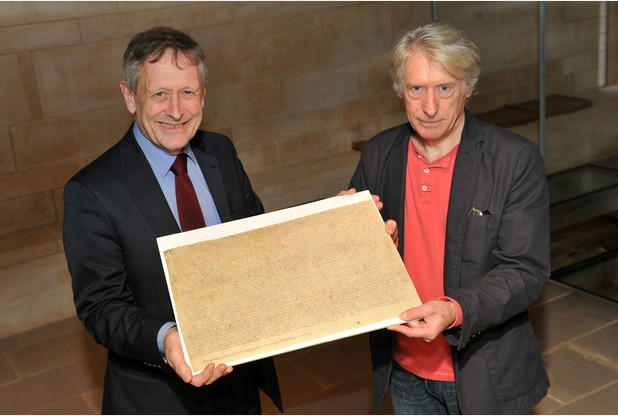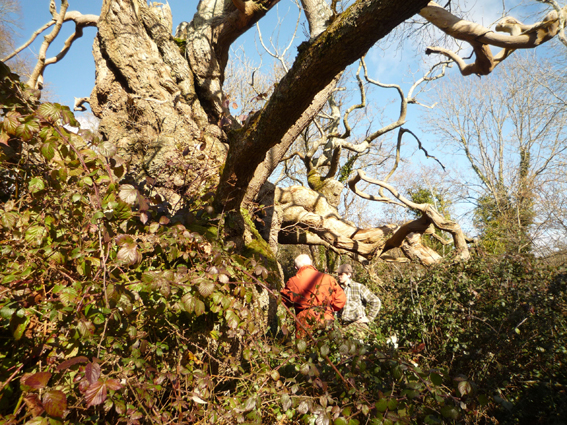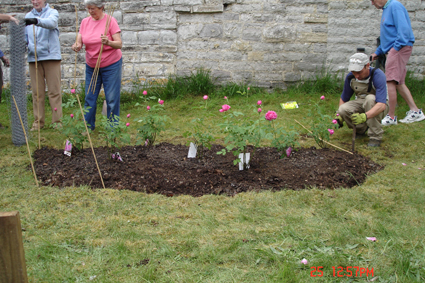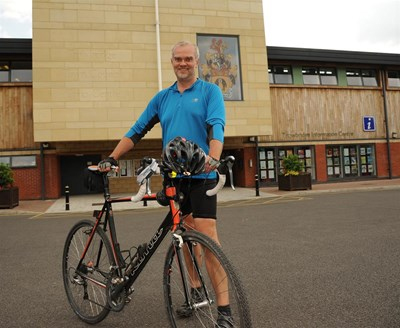Projects
When the Association was formed, it agreed a number of projects that it would organise for all its members. Not every village or town was obliged to participate in each one, but of course the more who could, the greater the impact. In addition to these projects, many other local events took place, including re-enactments, jousting, processions, exhibitions of embroidery, music, drama, and dozens of other community-based activities.
Magna Carta facsimile and exhibition
The main project was to provide a parchment facsimile of one of the British Library’s four copies of the 1215 Magna Carta to each village or town where the Magna Carta barons had their chief manor (or caput). The facsimile was framed locally and a brass plate supplied by the Association to attach to the frame for those who wanted it (the photograph shows the Association’s chairman handing over a facsimile to the mayor of Leicester, Peter Soulsby, in November 2014). With the facsimile, the Association undertook to provide two roller banners that could be displayed either side of the framed Magna Carta. One was about how Magna Carta came into existence, and the other about the local baron. Each village and town was to find a permanent place to display their facsimile for local residents, children and visitors to see. Funding for this project was provided by the Magna Carta Trust’s 800th Anniversary Commemoration Committee.
A ‘Magna Carta’ oak tree
Cuttings were taken by the Woodland Trust from an 800-year-old oak tree that is known to have been associated with King John. It stands on privately owned land that used to be a deer park where John went hunting. The cuttings were grafted onto oak stock but none successfully grew. Instead, acorns were collected from the ‘Parliament Oak’ in Sherwood Forest, which is believed to be as old although not directly connected with King John. The resulting oak saplings were given to nine member villages and towns for planting out in 2019, and the town of Lanvallay in Brittany where Walkern’s baron came from. This project was self-funded and supported by the Woodland Trust.
‘Magna Charta’ roses
As many plants as could be found in England and France were obtained for the Association’s members to create horticultural displays. The ‘Magna Charta’ rose is an older variety, but it’s only connection with the events in 1215 is it’s name. The photograph shows one of the first displays to be planted on 25 April 2015 in Curry Mallet, Somerset. This project was self-funded.
‘Strike a Blow for Democracy’ and ‘LiberTeas’
Many of the villages and towns rang their church bells on Sunday 14 June, together with bell-ringers elsewhere in the country as part of the Central Council of Church Bell Ringers ‘Strike a Blow for Democracy’ initiative. Some organised a special church service, and others followed the bell-ringing with a ‘LiberTea’ (a Houses of Parliament initiative), where residents met up for a cup of tea and cakes, with or without speeches and talks about Magna Carta, democracy and freedom. This project was self-funded.
The Magna Carta bike ride
Lance Allan, the Town Clerk at Trowbridge Town Council, one of the Association’s members, cycled to each of the twenty-five Magna Carta barons’ villages and towns. This symbolised 800 years in 800 miles. Lance left Curry Mallet in Somerset on Saturday 20 June and arrived in Alnwick in Northumberland on Sunday 28 June. At each stop, members provided him with sustenance for the next leg. During his journey he raised money for the ‘Dorothy House Hospice Care’ and ‘Re~cycle (Bicycle Aid for Africa)’.
Magna Carta merchandise
Because most of the Association’s projects were self-funded, additional income was earned from sales of a Magna Carta greetings card and tea-towel.




